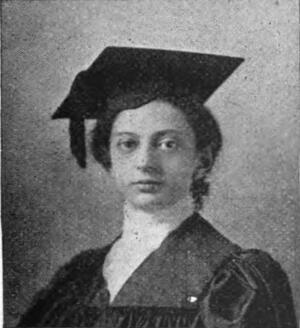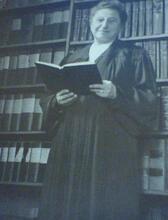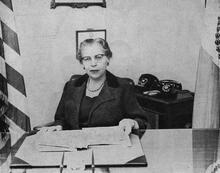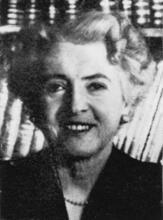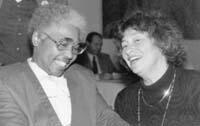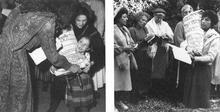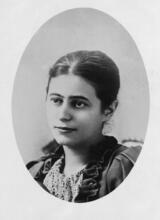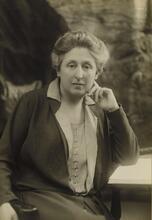Rosalie Loew Whitney
Rosalie Loew Whitney was the first woman to become the acting attorney of the New York Legal Aid Society. She married Travis Harvard Whitney in 1903, and the couple practiced law as Loew & Whitney from 1903 until 1907. Rosalie Whitney joined the Brooklyn Woman’s Suffrage Party in 1917 and was the New York congressional chair in the Woman’s Federal Equality Association and a speaker for the National American Woman Suffrage Association at the House of Representatives suffrage amendment hearing in 1918. Following Travis’s death in 1934, Mayor LaGuardia appointed Rosalie Whitney first deputy license commissioner of New York City and, in 1935, a justice of the Domestic Relations Court.
Family and Education
In 1901, Rosalie (Rose) Loew became acting attorney in chief of the New York Legal Aid Society. She was the first woman to hold that post. Born May 4, 1873, she was the second daughter and third child of Hungarian-born attorney William Loew and milliner Lottie (Wechsler) Loew’s three daughters and three sons. Her paternal grandfather was Reform rabbi Leopold Loew, influential in the emancipation of Magyar Jews in 1867.
Rosalie, who often helped in her mother’s store, was educated in the public schools and earned a BA from Hunter College (1892) and an LLB from New York University (1895). After she was admitted to practice, her father made her his law partner in Loew and Loew.
In 1897, Whitney moved to the Legal Aid Society. Most of the cases were wage claims. Fluent in German, Yiddish, and Hungarian, she also understood other languages, and judges allowed her to act as interpreter as well as counsel. She was enthusiastic, energetic, and tireless; her arguments were made in a “low, clear voice” with “wit and sense.”
Marriage
Travis Harvard Whitney, an Indiana-born (June 22, 1875) Methodist who graduated from Harvard Law School in 1903, was assistant secretary of the young New York City Citizens Union. He went to Legal Aid as one of Rosalie’s volunteer assistants. They were married in 1903. It is known that she converted to Protestantism, although records of the details are not available. The Whitneys may not have been wholly estranged from her family: Travis gave a speech in synagogue, and in the 1930s, Rosalie helped her parents’ relatives resettle in the United States.
The couple practiced law as Loew & Whitney from 1903 until 1907. In 1903, while president of a local women lawyers’ association, she applied for admission to the Association of the Bar of the City of New York, trying to break the barrier for women, but she withdrew her application in 1904. However, she was in the first group of women admitted to membership in 1937. During the three-year period when her sons were born, she practiced part time. The sons were Travis Jr. (b. 1904), John L. (b. 1905), and William T. (b. 1907).
Travis and Rosalie Whitney’s professional lives were marked by appointment to state and local public office. Travis, a transportation specialist, practiced privately between positions. In 1933 Mayor Fiorello LaGuardia appointed him civil works administrator. Intense and dedicated, Travis labored until he collapsed and, on January 8, 1934, died at fifty-nine after complications from emergency surgery for a bleeding ulcer.
Later Career
Rosalie Whitney joined the Brooklyn Woman’s Suffrage Party in 1917 and was the New York congressional chair in the Woman’s Federal Equality Association and a speaker for the National American Woman Suffrage Association at the House of Representatives suffrage amendment hearing in 1918. She was a Republican Party statewide campaigner in 1920 and developed Republican women’s organizations. A founder of the New York Women’s National Republican Club, she was an officer and its attorney.
Republican governor Nathan Miller appointed her commissioner of the State Department of Labor in 1921; she served more than a year. In May 1930, as volunteer director of the Neighborhood Laundry Association in Brooklyn, Whitney was described as the “first woman dictator of an American industry.”
Following Travis Whitney’s death in 1934, Mayor LaGuardia appointed Rosalie Whitney first deputy license commissioner of New York City and, in 1935, a justice of the Domestic Relations Court. Rosalie Loew Whitney sat until her death at sixty-six on September 3, 1939, from leukemia. After a large funeral in Holy Trinity Protestant Episcopal Church, she was buried in Greenwood Cemetery, Brooklyn, New York.
AJYB 6 (1904–1905): 206; Anthony, Susan B., Elizabeth Cady Stanton, et al., eds. History of Woman Suffrage Vol. 5 (1922): 578, 580.
Harkness, LeRoy T. “Memorial of Travis Harvard Whitney.” Association of the Bar of the City of New York Yearbook, 1934.
NYTimes, January 9, 1934; Obituary. NYTimes, September 4, 1939, 19:3.
Sicher, Dudley F. “Memorial of Rosalie Loew Whitney.” Association of the Bar of the City of New York Yearbook, 1940.

